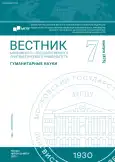Political Communication in the USA in the Field of Historical Discourse Studies
- Authors: Seskutova I.K.1
-
Affiliations:
- Moscow State Linguistic University
- Issue: No 7(875) (2023)
- Pages: 112-118
- Section: Linguistics
- URL: https://bakhtiniada.ru/2542-2197/article/view/350802
- ID: 350802
Cite item
Abstract
The author considers the prospects for turning to the tools of historical discourse studies while examining American presidential communicative culture. It is argued that euphemisation plays a constitutive role and is used as a leading cognitive strategy in constructing a political public speech. An intense pragma-emotional impact on the addressee is provided by the polytropic character of context and extended metaphor, viewed as an invariant characteristic of American presidential discourse.
About the authors
Irina Konstantinovna Seskutova
Moscow State Linguistic University
Author for correspondence.
Email: Seskutova@bk.ru
PhD (Philology), Associate Professor, Associate Professor at the Department of Stylistics of the English Language, Faculty of the English Language
Russian FederationReferences
- Seskutova, I. K. (2016). Perception of Multimedia Messages and Effects. Vestnik of Moscow State Linguistic University. Linguistics, 19 (758), 55–62. (In Russ.)
- Klyuchevskij, V. O. (1988). Pis’ma. Dnevniki. Aforizmy = Letters. Diaries. Aphorisms. Collection of papers, vol. III. Moscow: Mysl’. (In Russ.)
- Mirkin, Ya. M. (2023). Kratkaya istoriya rossijskikh stressov. Modeli kollektivnogo i lichnogo povedeniya v Rossii za 300 let. A Brief History of Russian Stresses. Models of collective and personal behavior in Russia for 300 years. Moscow: AST. (In Russ.)
- Kubryakova, E. S. (2004). Yazyk i znanie: Na puti polucheniya znanij o yazyke. Chasti rechi s kognitivnoj tochki zreniya. Rol’ yazyka v poznanii mira = Language and knowledge: On the way to gaining knowledge about the language. Parts of speech from a cognitive point of view. The role of language in the knowledge of the world. Moscow: Yazyki slavyanskoy kul’tury. (In Russ.)
- Stepanov, Yu.S. (1995). Izmenchivyj obraz yazyka v nauke XX veka = The changing image of language in the science of the twentieth century // Language and science of the twentieth century // Yazyk i nauka XX veka = Language and science of the twentieth century. Moscow: Rossijskij gosudarstvennyj gumanitarnyj universitet. P. 10–35. (In Russ.)
- Rikyor, P. (2008). Konflikt interpretacij: Ocherki o germenevtike = Conflict of Interpretations: Essays on Hermeneutics. Moscow: Akademicheskij proekt. (In Russ.)
- Melnik, A. V., Shemonaev, T. I. (2019). Discourse Picture of the World: Ontological Analysis. Izvestia Ural federal university journal. Series 3. Social and political sciences, 14, 2(188), 5–13. (In Russ.)
- Kochetova, L. A., Il’inova, E. Yu. (Eds.). (2017). Istoricheskaya dinamika diskursivnykh praktik = Historical dynamics of discursive practices: a collective monograph. Volgograd : Volgogradskij gosudarstvennyj universitet. (In Russ.)
- Zvereva, M. I. (2017). History of the Study of Euphemisms in Domestic and Foreign Linguistics. Philology. Theory and Practice, 12(78), 4, 86–90. Tambov: Gramota. (In Russ.)
- Galperin, I. R. (2012). English Stylistics. Ocherki po stilistike anglijskogo yazyka: Opyt sistematizacii vyrazitelnykh sredstv. Moscow: Librokom. (In Russ.)
- Larin, B. A. (1961). Ob ehvfemizmakh = About euphemisms. In Larin, B. A. (ed.), Problems of linguistics (pp. 101–114): collection of articles. Leningrad: Izdatelstvo Leningradskogo universiteta. (In Russ.)
- Mugair, S. K. (2014). A Comparative Study of Euphemism and Dysphemism in English and Arabic with Special Reference to Political Discourse. Journal of Advances in Linguistics, 1, 259–268.
- Zykova, I. V. (2021). Interdiscursive Parameters of Linguistic Creativity (the case study of cinematic discourse). Critique and Semiotics, 2, 11–29. (In Russ.)
Supplementary files










